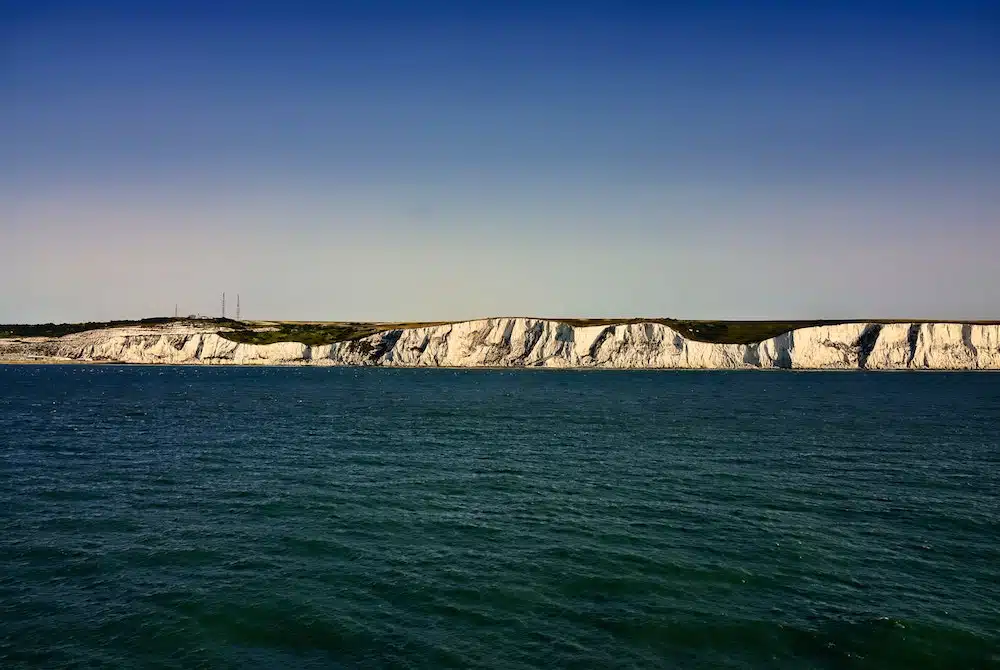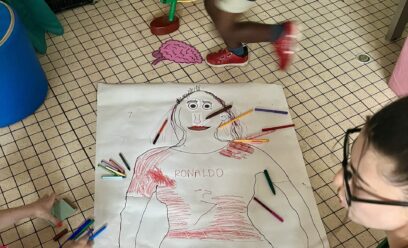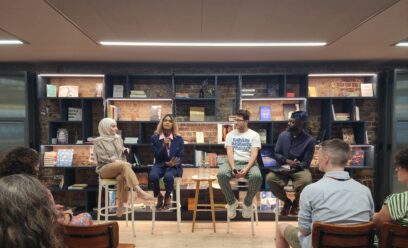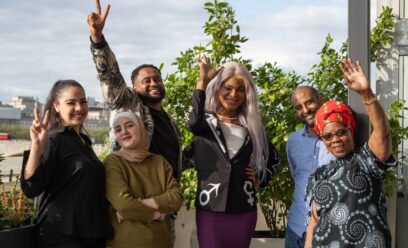‘I am a human, you know. Tell them that’
Posted by IMIX on October 8, 2019Denise Meredith reflects on a recent trip to Calais and Dunkirk – and why it’s more important than ever to ensure the stories of those attempting to cross the Channel are heard.
“S’il vous plaît…” said the boy as I took my seat on the upturned bucket. The acrid smoke from a cooking stove smothering us in white ash, red cinders. Polite, he gestured for me to join them in their temporary home, a shabby verge by a roadside. This boy with his perfect teeth and pockmarked skin, the hardship of living on wasteland, was 18 at the most. He was weathered, slight-of-build, like he hadn’t eaten in a while. He was evidently wearing somebody else’s clothes: a ski jacket which was padded and bitterly ironic, for this child would not be swishing through snow-capped mountains anytime soon.
His fantasy of escape not the same as my city-dwelling kids.
Freedom for the boy was a life beyond this dusty verge. Just over that wall and the bales of steel and barbed wire, the criss-cross of autoroutes towards a wind-swept beach and over the choppy sea full of heavy traffic, to a place he yearned to go.
I asked him: “Why? Why England?”
He impressed me with linguistic skills as he talked about humanity, safety, refuge. “I am a human, you know. Tell them that. That I’m a boy. I’m not an animal.”
“Where did you learn your English?” It was all I could think to ask – an old-hand in this scenario.
“From a book I read on the way here.” He explained how he had travelled a million miles already to get to get to this verge via Greece and a makeshift camp in Libya. “Which is full of bad fellows, you understand me?” I did. More than he could know.
“He can speak German, too,” one of the others in his group piped up.
We were entertainment: our little gang of four from IMIX and Doctors of the World, breaking up the boredom. A day which would otherwise be like any other day for these lads – punctuated by queues for water and food, lorries going nowhere or a game of dusty football before nightfall again. Then it was time to dice with death, try to scale that wall, head to the beaches, find a kayak, a dinghy or, worst-case scenario, try and swim there. These boys knew they were trapped. But they had to try, even if they died trying. They had to get to England.
I thought about these boys when I got back to my room that evening.
A room with a kitchen, cushions, fairy lights, a seaside view. I thought about the rag-tag nature of it all, the pointlessness of it all and how it reminded me of old times when I was a Red Cross field worker in refugee camps around the world. How it reminded me of Bosnia, Afghanistan, Cambodia, Kosovo, Rwanda.
But this place, full of barbed wire, concrete and border guards was different – more shocking in a way. Here in Calais and Dunkirk, there wasn’t any war. No mortar attacks, no carpet bombings, no amputees, no screaming. Here in Calais, it was insidious, pernicious and habitual for everyone involved. Just a few stand-offs with the tooled-up police, the odd baton on their heads, a shove, a kick, a headlock when least expected as the migrants were wrestled off the back of lorries – day-in and day-out – but on the whole, the violence was restrained. The body count contained. The acceptable face, almost dull version of refugees and asylum seekers, then.
In some ways, this situation seemed more sinister, so utterly ingrained.
The numbers in northern France are small. The needs of these people are minimal. A house, a piece of paper, the ability to go to school or university, get a job, feed and clothe a family. Safety, refuge, opportunity – is all they ask.
What about Britain and our complicity in all of this? We could take them all. We could give these people sanctuary. A safe passage to where they want to be. But increasingly, when it comes to offering asylum seekers sanctuary it feels like Britain has lost its inner core – our values of fairness, compassion, justice and humanity.
The children I met, some as young as eight, had courage, determination, youth and energy. The very qualities we say we admire. The sort of qualities I hear MPs pontificate about. But it’s being squandered, left to stultify and die. What a waste of young lives.
“Send them all home,” says whoever is in charge. But home is not home anymore for these kids. These boys are displaced, victims of political oppression, casualties of war. They are due protection under international law. But Britain shuts its door time and time again.
It doesn’t have to be a war of attrition, of pumped-up special forces ganging up on kids. It doesn’t have to be a dystopian nightmare. We can do better than this and that’s where our sector comes into its own.
Not just the field work which offers hope, which heals and restores but those who advocate on behalf of those who have lost their voice. Which asks our government for little more than refuge and safe passage. To give people the opportunity for asylum and to build a better life. To show moral courage and leadership.
These last few months, our communications work in response to the crossings has been an inspiration to us all. To see the sector on both sides of the channel work so hard, putting out timely and hard-hitting quotes, dealing with the media in the field, offering people up for interview over the weekends and evenings. Most of all, the people themselves coming forwards to tell their stories which is what we need right now. Every effort being made to change the conversation back to hope and humanity again.
We’ve come together as a team, as force to be reckoned with. We’ve got the wind in our sails.
We’re not going to be stonewalled, ignored or defeated anymore.
It’s a pivotal moment. Why now I ask myself? Maybe we sense the time is now or never. That we have to speak with one united voice, support each other, that we have to empower those struggling to find a voice. We need to show the media the human, personal stories time and time again, which might one day, maybe soon, tip the balance back to kindness again.




